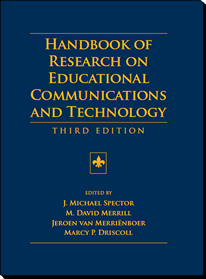|
15. Programmed Technologies
Barbara B. Lockee, Miriam B. Larson, John K. Burton, and D. Michael Moore
16. Educational Hypertext
Dale S. Niederhauser
17. Computer-Mediated Technologies
Arthur C. Graesser, Patrick Chipman, and Brandon G. King
18. Computer-Mediated Communications Technologies
Jay Pfaffman
19. K–12 Library Media Centers
Delia Neuman
|
37. Adaptive Instructional Systems
Jung Lee and Ok-Choon Park
38. Problem-Based Learning
Woei Hung, David H. Jonassen, and Rude Liu
39. Behavioral, Cognitive, and Technological Approaches to Performance Improvement
Ruth Colvin Clark and Frank Nguyen
40. Resource-Based Learning
Michael J. Hannafin and Janette R. Hill
41. Instructional Models in Domains and Professions
Henny P. A. Boshuizen, Caroline Phythian-Sence, Richard K. Wagner, Koeno Gravemeijer,
Geerdina Maria van der Aalsvoort, Fleurie Nievelstein, Tamara van Gog, Frans J. Prins,
Tim Dornan, Albert Scherpbier, and John Spencer
|
48. The Social Consequences of Design and Development Teams
Laura Blasi, Stephen M. Fiore, John Hedberg, and Richard F. Schmid
49. User-Centered Design and Development
Eun-Ok Baek, Kursat Cagiltay, Elizabeth Boling, and Theodore Frick
50. Tools for Design and Development of Online Instruction
Bryan L. Chapman
51. Artifacts as Tools in the Design Process
Elizabeth Boling and Kennon M. Smith
52. Systems Design for Change in Education and Training
Sunnie Lee Watson, William R. Watson, and Charles M. Reigeluth
|
|
53. Theory Development
Jan Elen and Geraldine Clarebout
54. Research Designs
Steven M. Ross, Gary R. Morrison, Robert D. Hannafin, Michael Young,
Jan van den Akker,
Wilmad Kuiper, Rita C. Richey, and James D. Klein
55. Data Collection and Analysis
Tamara van Gog, Fred Paas, Wilhelmina Savenye, Rhonda Robinson, Mary Niemczyk, Robert Atkinson, Tristan E. Johnson, Debra L. O’Connor, Remy M. J. P. Rikers,
Paul Ayres, Aaron R. Duley, Paul Ward, and Peter A. Hancock
56.Foundations for the Future
ChanMin Kim, JungMi Lee, Jeroen J. G. van Merriënboer, M. David Merrill, and J. Michael Spector
|
